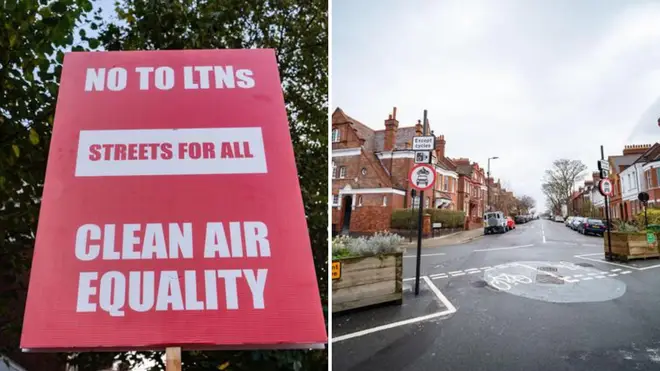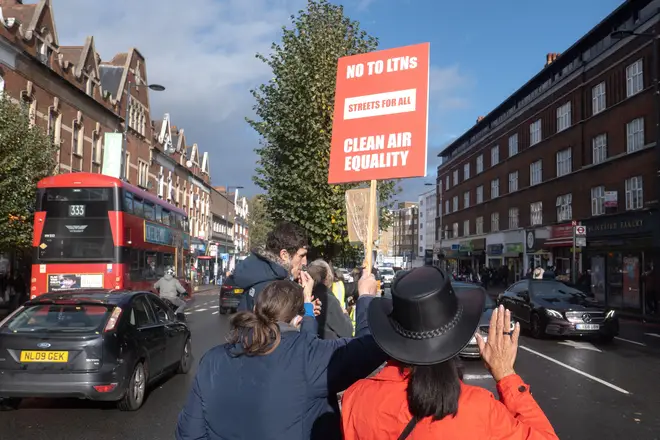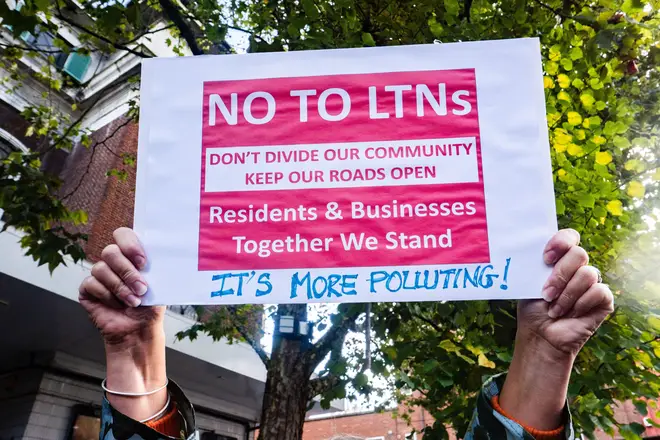
Lewis Goodall 10am - 12pm
21 December 2023, 12:35 | Updated: 21 December 2023, 13:53

South London low traffic neighbourhoods have been blamed for causing chaos in the area, with special needs children missing school, a food bank running low on supplies and school leaders fearing pupils will be mugged.
The Streatham Wells LTN trial, which began at the end of October, restricts traffic from coming into certain roads in a south-west London neighbourhood. The trial is expected to last between a year and 18 months.
Local authority Lambeth Council brought in the LTN to encourage people to be more active, make streets safer and generally improve the neighbourhood. Some locals have welcomed the move.
But as with other LTNs across London, the move has sparked complaints from people who say their lives and community have been made worse by not being able to use cars, and from increased traffic on boundary roads.
The headteacher of Bishop Thomas Grant School said that she had written to the local MP and police sergeant to raise concerns for the safety of children, amid fears of increased crime.

Bernadette Boyle said in a letter to parents earlier this month: "The Low Traffic Neighbourhood (LTN), which was introduced by Lambeth, has caused significant traffic in the local area. I have previously raised it with Lambeth council, and last night wrote to our local MP and Police Sergeant about the issues of crime on the High Road, and the potential for more muggings now that there are no cars on the roads of the LTN."
Ms Boyle added that many parents have issues getting to the school because of the "significant traffic issues".
She went on: "Unfortunately, I do not have the power to change what Lambeth have introduced. I have, and will continue to voice my concerns about the LTN.
"Until Lambeth decide to do something to change the situation, we are stuck with it, and therefore the students, just as staff have, need to work out routes to access school in a timely fashion."

Meanwhile the mother of two children with special educational needs (SEN) said they cannot face the longer journey to their school that the LTN has necessitated - and so are missing out on education.
The woman, who didn't want to be named, said of one of her sons: "One day, he was so disregulated by the time he got to school that the taxi had to turn around and bring him back.
She told the South London Press: "He was in meltdown all afternoon because of that. The next morning he refused to come out and go to school because he couldn’t face the journey."
I met wonderful Marge, aka "sweary Mary"😍 stopped at a traffic filter at point A, in #streatham wells #ltn.
— Garrads Rd & neighbours SW16 (@LambethLook) December 20, 2023
Wanting to collect her 92 yr old friend (who uses a walking frame) from a little further along Valley Rd, & take her for a spin😇
📸 1pm Weds 20th Dec pic.twitter.com/WgcgHAfyUl
One resident told LBC that the LTNs risk fraying the bonds of local community. She told of an elderly woman, Marge, who had wanted to pick up her 92-year-old friend from her home on one of the streets in the LTN.
Marge, in a video shared on social media, explained how she was unable to drive her friend to the doctors' surgery to give staff a Christmas present, and would have been forced to take a much longer route.
Marge told LBC that it was "diabolical" and "so, so bad". She added: "I only wanted to take my friend to the doctor, and I couldn't."
The resident who shared the video called the situation "absurd", adding that the community-minded efforts of people like Marge take pressure off public services, and the LTN makes this harder.
A separate LTN caused difficulties elsewhere in Streatham. Norwood and Brixton food bank said that "road restrictions" were making deliveries slower, as they asked for more volunteers to help make up the shortfall.
They told local outlet Brixton Buzz: "We have a huge number of parcels to get out today and rest of the week.
"Road restrictions are slowing down deliveries & 50 + parcels need to go out per day to people in crisis from the foodbank based in St Margaret’s Church Barcombe Ave. SW2 3BH, Streatham.
"Anyone who can do even 2/3 deliveries today or Friday would be great help."
A Lambeth Council spokesperson said: “This trial low traffic neighbourhood is early in its trial and we appreciate this is a big change for people that can present challenges for some. We are listening and working to ensure it best works for local people.
“We have worked with public health experts, as well as emergency services and other public bodies in designing this scheme. During the development of low traffic neighbourhoods blue badge exemptions were introduced in recognition of need and community feedback.
“All roads remain fully accessible, however traffic flows are altered to stop through traffic.
“We are working hard to ensure this initiative meets its aim, including reducing air pollution which most impacts the young and elderly. It is also designed to support people to walk or cycle more, to cut road danger and improve the local neighborhoods.
“It’s worth noting that the majority of households in Lambeth, around 58 per cent, do not have access to a car. Disadvantaged groups are even less likely to own a car, but more likely to be affected by the impacts of car use such as poor air quality, climate change impacts and road danger – so there’s a real equality issue here too.
“As people embrace the changes we expect congestion will ease and those making essential journeys by car will be able to do so more easily.”